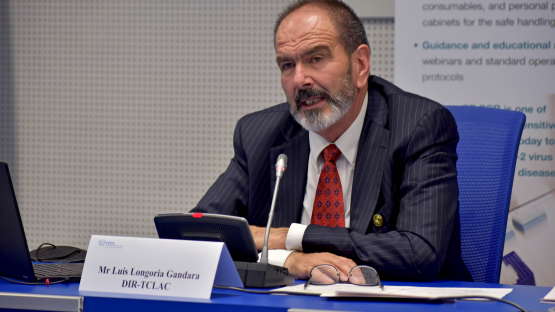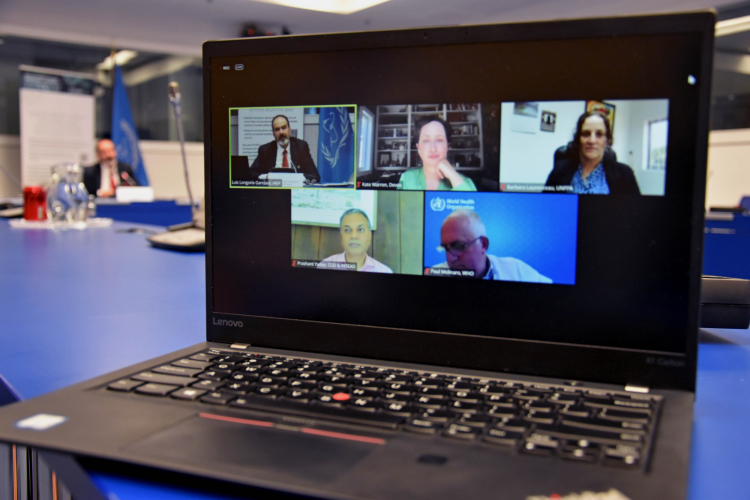Speaking at a panel discussion hosted by Devex on the margins of the United Nations General Assembly (UNGA) on 14 September, IAEA representative Luis Longoria, Director of the Division for Latin America and the Caribbean, described how the IAEA has contributed to global efforts to address the COVID-19 pandemic.
“We responded to the WHO’s key message—‘Test, test, test’—by supporting the efforts of national health authorities in 130 countries and territories to rapidly and accurate detect the presence of coronavirus,” said Longoria. “Following the outbreak of COVID-19, the global community mobilized, and each international organization responded according to its own specialities and competencies. The IAEA contribution focused on the delivery of support for PCR – a nuclear-derived technology recognized as the gold standard for quick and effective virus detection and diagnosis.”
Longoria was joined in the panel discussion by representatives of the United Nations Population Fund (UNFPA) and the World Food Programme (WFP), who also highlighted the unique contributions made by their organizations in the global fight against COVID-19. The COVID-19 response of all three organizations received financial support from Takeda Pharmaceutical Company.
Also participating in the event were experts from the World Health Organization, the Center for Global Development, the Africa Centres for Disease Control and Prevention and from the African non-profit association, the Central Purchase of Generic Essential Drugs and Medical Consumables (CAMEG).
Alongside its devastating impact on people’s lives and long-term health, the COVID-19 pandemic has exposed the preventable human costs and financial losses linked to inadequate health systems and medical supply chains. Without resilient health systems, supported by ongoing technical training and
robust supply chains, countries are insufficiently ready to tackle future pandemics and outbreaks, leaving communities vulnerable, speakers said.
Around the world, but particularly in emerging economies and developing countries, the ongoing fight against existing infectious and non-communicable diseases (NCDs) was compounded by the emergence of COVID-19, which placed an unprecedented strain on healthcare providers, equipment suppliers and medical staff. Enhanced cooperation between countries and within the international development community will be required to build strong regional supply chains and robust stocks and inventories, capable of withstanding supply shocks, noted Kate Warren, Executive Vice President of Devex, in her opening remarks as the event moderator.
“Despite the human and economic devastation caused by the COVID-19 pandemic, collaboration and partnerships have emerged as powerful tools to develop and scale-up assistance,” said Longoria. “WFP’s role has been key to facilitate supply chain initiatives with national governments and health actors, UNFPA’s assistance was key to support frontline health workers, especially in maternal health services, and the IAEA and the role of the nuclear and nuclear derived technologies have played a key role in building resilient health systems to address the pandemics, providing support and technical advice and guidance.”
The IAEA has been responding to Member State requests for assistance since the first months of the pandemic, and has so far supplied more than 300 laboratories in 130 countries with diagnostic equipment and associated accessories. It has also provided online training and one-to-one support for laboratories. IAEA support has benefitted from generous extrabudgetary contributions totalling more than €27.4 million contributions from Member States and Takeda.
The IAEA has extended further support to national laboratories through the provision of expert advice, virtual training courses and webinars. Since the initial outbreak of the coronavirus in early 2020, the Agency has organize online training events in several languages on how molecular diagnostic laboratories should be established, equipped and their processes quality-controlled to ensure that samples are appropriately received, stored and tested using real time RT-PCR.
Prashant Yadav, a Senior Fellow at the Center for Global Development, underscored the need to develop and sustain regional supply chains, which would be better prepared to handle the stock and supply interruptions now associated with pandemics. Unlike ‘medical supply autarkies,’ in which countries rely on closed, national chains, Yadav suggested that regional arrangements would provide more resilient, flexible and reliable supply pathways.
Barbara Laurenceau, a Representative of Benin at UNFPA, shared the experiences of Beninois communities facing the worsening pandemic in early 2020. Effective supply chains can mean the difference between the availability of suitable personal protective equipment versus cloth masks, or between conducting accurate tests or facing delays in detection, explained Laurenceau.






